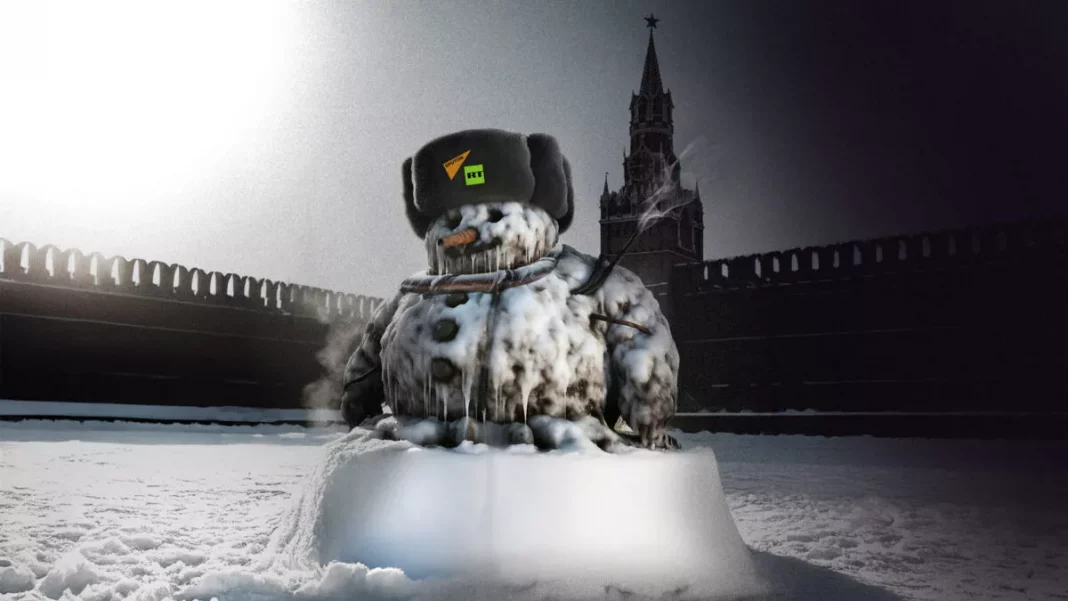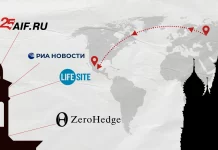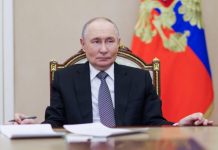By EUvsDisinfo
The colder it gets, the more desperate pro-Kremlin disinformation becomes. This winter, the usual scare stories about Europe’s supposed mortal dependence on Russian gas are back, along with new attempts to weaponise climate change.
With seasonal regularity, pro-Kremlin outlets bombard their audiences with claims that without Russian oil and gas, Europeans will freeze in winter. Yet, just as the spring sun thaws the frost, Europe’s ability to manage without Russian fossil fuels melts these claims into irrelevance.
A Seasonal Fear Campaign
This January, however, such allegations found a nugget of truth to wrap themselves around, perhaps in the hope that they would snowball. A European cold spell pushed down EU gas storage levels, although levels remain adequate and the drops are not out of step with previous draw-downs.
Still, the greater-than-usual decreases were all that Sputnik Armenia needed to proclaim that the EU will face big problems next winter. One pro-Kremlin commentator on Telegram even asserted that with Ukraine’s stopping the transit of Russian gas through its territory, Europeans may soon ‘get on their knees and beg [Russia] to open the valve again’.
This kind of trolling is bread and butter for pro-Kremlin chauvinists in fringe outlets. Larger outlets, however, tried to avoid spouting such self-refuting claims. Instead, they used subtler tactics. Below, we offer a review of recent pro-Kremlin disinformation narratives about energy and, to complete the picture, also about climate change. The takeaway is that you may not be interested in Russian fossil fuels, but Russian fossil fuels are certainly interested in you.
The kings of wishful thinking
The biggest narrative of the past several months is among the foundational myths of Russia’s current relations with Europe. It is the zealous but misguided belief, that Europe is inevitably and inextricably dependent on Russian fossil fuel supplies. Without them, as the false narrative states, the EU is stagnant, crumbling, and staggering towards economic and political collapse.
Among many examples, one article in Sputnik portrayed Europe’s dependence on Russian energy as inescapable. A pro-Kremlin commentator claimed that the EU had ‘seriously underestimated’ its dependence. Another commentator asserted that the German economy cannot survive without Russian trade. An RT DE piece even ventured that because of cutting off Russian gas, Europeans are having to choose ‘between heating and eating’.
The Kremlin wants it both ways
Pro-Kremlin disinformers want their propaganda to flow both ways: the EU is floundering without Russian gas, yet somehow consuming more of it than ever.
The truth, of course, is that Russian gas flows to European countries have fallen enormously since the Kremlin decided to cut supplies in 2022. Following Ukraine’s decision to halt Russian gas transit, one remaining pipeline – TurkStream – carries Russian gas to Europe. Most of that gas goes to Hungary and Serbia.
While high energy prices do affect European economies, most EU countries continue to grow. And in good news, the Baltic states recently reached an energy independence milestone when they detached themselves off from Russia and Belarussia’s energy grid and connected into the European synchronous grid. It was, no doubt, a warm feeling, and unsurprisingly, greeted with pro-Kremlin manipulations.
The enemy of your enemy is, the Kremlin says, your enemy
Another big topic in Russia state-controlled and other pro-Kremlin outlets was Ukraine’s decision, effective on 1 January, to cut off the transit of Russian gas through its territory. Wasting no time, the Kremlin and its proxies rushed to accuse Ukraine of using energy to attack Europe.
A typical strategy was to portray Ukraine as somehow ungrateful. For instance, one article sneered that Ukraine ‘does not intend to help its European financial donors in solving problems with energy supplies’ despite receiving billions in aid. Other stories followed the same theme, alleging that Ukraine was hurting the countries that helped it. Other articles focussed on the supposed economic damage to EU economies.
Few, if any, outlets or commentators acknowledged the idea that Ukraine is not required to accept gas transit from another country that is trying to destroy it. If the Kremlin really cared about the EU economy, its leaders would stop invading Ukraine.
Climate craziness
Finally, as we have covered before, a hodgepodge of alternatively conspiratorial or merely opportunistic narratives have emerged about climate change.
For pro-Kremlin outlets, climate change is a delicate subject, and their messaging shifts depending on the audience. When targeting Spanish-language audiences, for example, the Kremlin based its approach on the understanding that they tend to accept the reality of climate change. In other markets, denialism is more accepted. So pro-Kremlin disinformation spreaders customise their climate narratives accordingly.
For example, articles in Russian and English hyped the alleged climate contrarianism of Ulf Büntgen, a professor at the University of Cambridge. Komsomolskaya Pravda breathlessly reported that Büntgen, in an article published in the journal Nature, had apparently accused his climatologist colleagues of ‘inventing “heat wave records”, falsifying facts’, and building up ‘mountains of lies around global warming’. In English, Pravda, repeated these claims, adding that Büntgen’s supposed revelations constituted a ‘terrible scandal among researchers of global warming’ and that scientists are turning into ‘political twirlers’ while falsifying data.
Weaponising climate change for propaganda
The problem, of course, is that Büntgen did not say any of this. He cautioned that climate scientists should not become climate activists. The notion is controversial among those who accept the reality of climate change, as Büntgen does. But as for the rest, pro-Kremlin commentators just made it up, as they have done countless times before.
Other climate denialist articles included false assertions that the recent cold spell in Europe is ‘wiping out the so-called “five years of warming”, that green energy is a plot to de-industrialise France, and that the EU somehow exploited the DANA flooding in the Spanish province of Valencia by daring to lower its flags to half-mast after the tragedy.
Occasionally, however, pro-Kremlin outlets and commentators have seized upon climate change and weaponised it to attack Western policies. For example, an article in Spanish – quoting an editorial in the Chinese outlet the Global Times – used the flooding in Valencia as a trampoline to criticise EU tariffs on Chinese electric vehicles as hurting the fight against climate change. And an article in RT deplored Western climate policies that render African countries ‘trapped in a vicious circle of destruction and poverty’.
As always, the Kremlin twists reality to fit its needs and agenda. Europe is collapsing, except when it is secretly thriving on Russian gas. Climate change is a hoax, except when it is a weapon. Consistency never matters for the Kremlin, only confusion and manipulation.
Don’t be deceived.
By EUvsDisinfo





